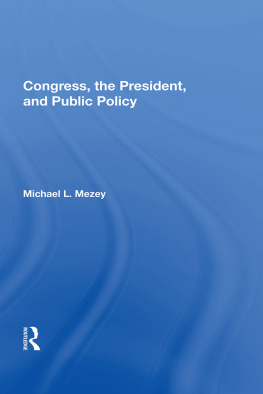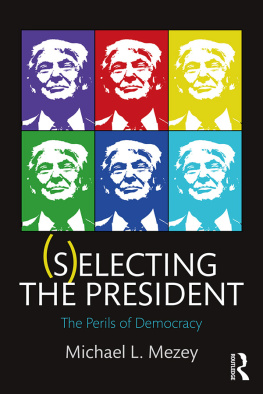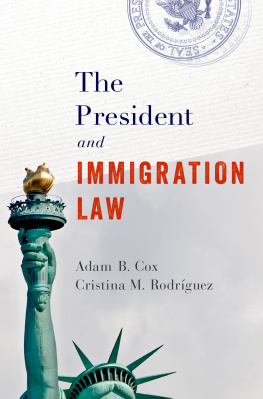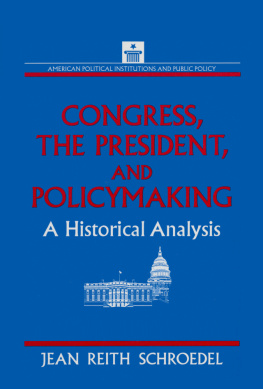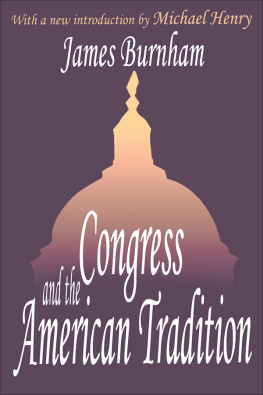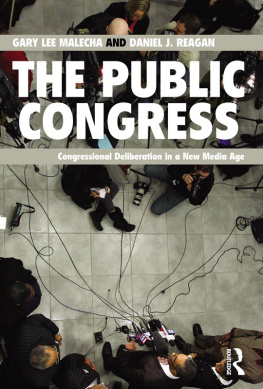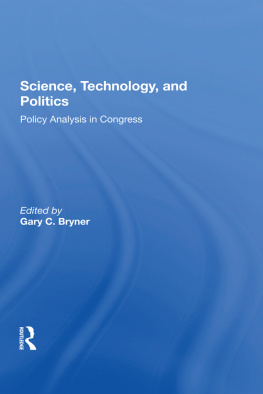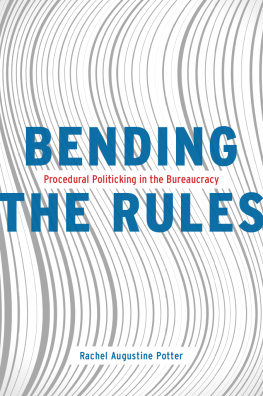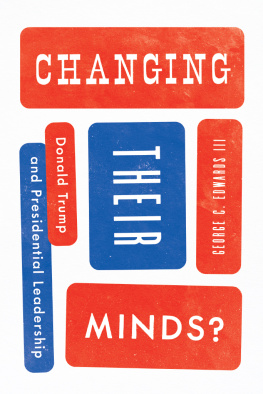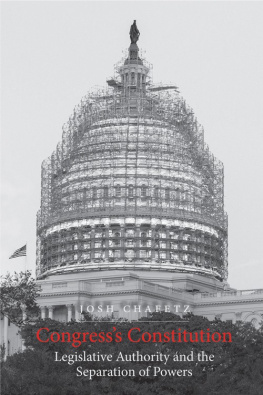Congress, the President, and Public Policy
TRANSFORMING AMERICAN POLITICS SERIES
Lawrence C. Dodd, Series Editor
Dramatic changes in political institutions and behavior over the past two decades have underscored the dynamic nature of American politics, confronting political scientists with a new and pressing intellectual agenda.
Transforming American Politics is dedicated to documenting these changes, reinterpreting conventional wisdoms, tracing historical patterns of change, and asserting new theories to clarify the direction of contemporary politics.
TITLES IN THIS SERIES
Remaking American Politics, edited by Richard A. Harris and Sidney M. Milkis
Managing the Presidency: The Eisenhower LegacyFrom Kennedy to Reagan, Phillip G. Henderson
Democracies in Crisis: Public Policy Responses to the Great Depression, Kim Quaile Hill
Congress, the President, and Public Policy, Michael L. Mezey
Issues and Elections: Presidential Voting in Contemporary AmericaA Revisionist View, Euel Elliott
Transformations in American Political Parties, edited by L. Sandy Maisel
The Evolution of Competition in House Elections, 19461988, Gary C. Jacobson
The Supreme Court and Partisan Realignment, edited by John B. Gates
Congress and the Administrative State, second edition, Lawrence C. Dodd and Richard L. Schott
The Transformation of Interest Group Politics, edited by Mark P. Petracca
First published 1989 by Westview Press
Published 2018 by Routledge
52 Vanderbilt Avenue, New York, NY 10017
2 Park Square, Milton Park, Abingdon, Oxon OX14 4RN
Routledge is an imprint of the Taylor & Francis Group, an informa business
Copyright 1989 by Taylor & Francis
All rights reserved. No part of this book may be reprinted or reproduced or utilised in any form or by any electronic, mechanical, or other means, now known or hereafter invented, including photocopying and recording, or in any information storage or retrieval system, without permission in writing from the publishers.
Notice:
Product or corporate names may be trademarks or registered trademarks, and are used only for identification and explanation without intent to infringe.
Library of Congress Cataloging-in-Publication, Data
Mezey, Michael L.
Congress, the President, and public policy / Michael L. Mezey.
p. cm.(Transforming American politics series)
Bibliography: p.
Includes index.
ISBN 0-8133-0493-8. ISBN 0-8133-0494-6 (pbk.)
1. PresidentsUnited States. 2. United States. Congress.
I. Title. II. Series.
JK585.M49 1989
353.0323dc20
89-32834
CIP
ISBN 13: 978-0-367-00685-3 (hbk)
For Susan
The relationship between the president and the Congress has been under discussion as long as the U.S. Constitution has existed. It has been a discussion in which presidents, congressional leaders, Supreme Court justices, scholars from many disciplines, political pundits of all stripes, and ordinary citizens of every sort have participated. For many of the participants, the point of the discussion has been to understand who governs or who should govern, the president or the Congress, and what techniques and resources each of these institutions has at its disposal to work its will upon the other. Although I will touch upon certain of these topics, they are not the point of the discussion to be found in this book. My concern is not who governs but rather how we are governed, how good or bad our public policies are, and how the quality of those policies is affected by the manner in which the president and the Congress share political power.
The argument of this book is that the current relationship between the president and the Congress has adversely affected the capacity of the U.S. political system to produce good public policy. More often than not, the president and the Congress find themselves in a stalemate about what should be done, or else the solutions that they are able to agree to or that they allow to go into effect without their agreement fail to meet either managerial or democratic criteria for good public policy. And whereas it is clear that these twin tendencies toward stalemate or poor public policy have become more pronounced in recent decades, it is equally clear that this state of affairs cannot be attributed, as it often is, simply to the bad presidents, or the self-seeking legislators, or the more intractable policy problems that many believe we have experienced over the past thirty years or so. Rather, our inability to produce good public policy is rooted in our constitutional arrangement of separate political institutions sharing power and in our political culture, which is inclined to view government more in malevolent than in benevolent terms. Although it would be fine to have better presidents, more public-spirited legislators, and easier policy problems, even if we had, stalemate and poor public policy would still characterize our political system. The United States will not have a government capable of achieving good public policy until the American people change the way in which they think about government and, based on that rethinking, make changes in their political institutions.
My first draft of the argument of this book was presented in an article entitled The Legislature, the Executive, and Public Policy: The Futile Quest for Congressional Power, which Susan Webb Hammond of American University agreed to print in the fine journal that she coedits with Jeff Fishel, Congress and the Presidency. The frankly critical and prescriptive tone of the article would have made it unacceptable to most scholarly journals, but Sukie recognized the need for scholars to address these systemic issues. Her only condition, to which I readily agreed, was that a response to my article be printed in the same issue. But after reading the highly critical response, by Joseph Cooper of Rice University, I wasnt at all certain that I had made a particularly good deal. Nonetheless, Joes comments, for all their acerbity, alerted me to several problems in my initial analysis, and what I say in the pages that follow is stronger because Joes critique was as scathing as it was.
During the two years that this book has been in the writing, my friends and colleagues at DePaul University have been a continuing source of personal and intellectual support for me. Dick Meister, dean of the College of Liberal Arts and Sciences, more than anyone else, made this book possible by agreeing to an arrangement of my time that allowed me to write while at the same time functioning as his associate dean. I am more grateful than I can say for his support. Although they do not share my somewhat old-fashioned concern for political institutions, Harry Wray, Jim Block, and Larry Bennett have always been willing to share their knowledge of U.S. politics with me and to hear my ideas as well. I am also pleased to acknowledge a grant from DePaus University Research Council, which enabled me to hire Carissa Scanlan, then an undergraduate student at DePaul, to track down some of the information contained in and is more fully acknowledged in the notes to that chapter.
Shortly after the Congress and the Presidency article came out, I developed a proposal for this book, which I sent to a number of publishers, and several of them expressed interest. But Miriam Gilbert and Holly Arrow at Westview Press were unique in telling me to write the book that I had in mind, rather than the book that they might have had in mind, and once contracting with me to do just that, they left me alone to do my work. Holly, who believed in this book before anyone else did (including me), left Westview early on in this project, but her replacement, Jennifer Knerr, was also unfailingly encouraging and upbeat (presumably a job requirement at West view). Jennifer also efficiently attended to the various tasks of arranging for scholars to read the manuscript, collecting their advice, channeling all of that back to me, leaning on me to make the manuscript shorter (and it took a great deal of leaning), and seeing the whole package off to Westviews editorial production staff. Fortunately, upon its arrival there, my manuscript fell into the gentle hands of Marian Safran, an extraordinarily capable copy editor. Marians skills and attention to detail saved me from countless errors in content and syntax, and for that I am very grateful. I am grateful as well for the suggestions that I received from Larry Dodd, Richard Fleischer, and Paul Brace, all of whom read and commented on my first draft. Naturally, all four of these good people are absolved from blame for any errors and misinterpretations that remain.

